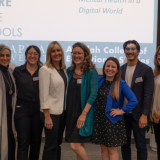Pilgrims and Indians- a Thanksgiving Love Story
November 26, 2012
Thanksgiving. While I have many fond memories of my family traditions, I have also come to recognize the complexity of this holiday. Do we choose to celebrate after light has been shed on the more accurate events associated with the historic feast story? If we do, how do we reconcile the conflicting portrayal? Many of us have pondered this, and it is cause for self-reflection to be certain. However, the focus of this article is the ongoing perpetuation of the stereotypical “Indian” and “Pilgrim” feast. I am not suggesting we scar young kindergarteners with the brutal truth we perpetually omit, but I wonder when historical accuracy trumps the dominant narrative that depicts a generous, kind-hearted pilgrim woman offering a bountiful tray of food to feather-wearing, bare-chested Native Americans. Where do we begin the revision of this story? Maybe we should begin by informing ourselves. Ashamedly, I must take my own advice.
Recently, in preparation for a lesson on the Thanksgiving holiday, I did a bit of research online. To my surprise and disappointment, I discovered a truth that was never taught to me. (In fact, I asked other teachers and soon-to-be teachers.) None of them learned about the role a woman played in establishing this North American holiday. We owe the modern concept of Thanksgiving to a woman named Sarah Josepha Hale. Hale, editor of Godey’s Lady’s Book and author of the famous “Mary Had a Little Lamb” nursery rhyme, spent 40 years advocating for a national, annual Thanksgiving holiday. In the years leading up to the Civil War, she saw the holiday as a way to infuse hope and belief in the nation and the constitution. So, when the United States was torn in half during the Civil War and Lincoln was searching for a way to bring the nation together, he discussed the matter with Hale.
Lincoln did indeed declare the fourth Thursday in November a national day of thanks. In true capitalist style, Roosevelt later changed it to the third Thursday to extend the shopping season, which suffered greatly during the Depression.
The dominant narrative serves to soften the rough edges of an ugly history, and we sometimes do not know how to revise the stories we have come to know as truth. What I am discovering is that I must unlearn some things that I have been taught. As teachers we have a big responsibility to question our own lessons and motives. We have the opportunity to teach responsibly in order to foster critical thinking and understanding.
By Marisol Rexach, Ph.D. in Education Student

